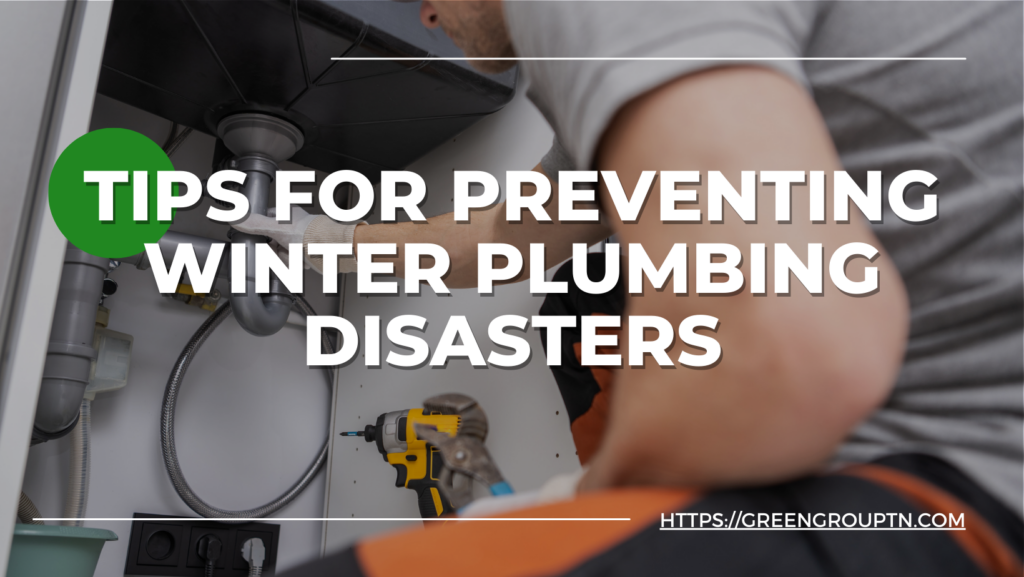
Winter can be tough on your home’s plumbing system. As temperatures plummet, your pipes are at risk of freezing, bursting, and causing costly damage. The good news? With a little preparation and maintenance, you can protect your plumbing and prevent winter disasters before they happen. At Green Group, we’re here to share our top tips for keeping your plumbing in top shape during the cold months.
1. Keep Your Home Warm
The easiest and most effective way to prevent your pipes from freezing is to keep your home warm. Set your thermostat to at least 68°F, even if you’re away. Consistent indoor temperatures can prevent the water inside your pipes from freezing and expanding, which is a leading cause of pipe bursts.
Take it a step further by insulating vulnerable areas such as crawl spaces, basements, and attics. Wrap exposed pipes with foam insulation or install heat tape for added protection. These small investments can save you thousands in repair costs down the line.
2. Let Your Faucets Drip
A slow-dripping faucet may seem wasteful, but it’s a smart way to avoid frozen pipes. When water flows—even at a trickle—it’s less likely to freeze inside your pipes. This simple step can relieve pressure in your plumbing system and reduce the risk of a burst pipe.
Make it a habit to let faucets that are connected to exterior walls drip during the coldest nights of the season. This practice is particularly effective for homes with older plumbing systems or pipes that have frozen in the past.
3. Seal Cracks and Gaps
Cold air can sneak into your home through small cracks and gaps around doors, windows, and other openings. This can lower the temperature around your pipes, increasing the risk of freezing. To combat this, inspect your home for drafts and seal any gaps with caulk or weatherstripping.
For extra protection, add foam pipe insulation to exposed plumbing in unheated areas like basements or garages. Sealing drafts doesn’t just protect your pipes—it also improves your home’s energy efficiency, keeping you warmer and reducing heating costs.
4. Keep Cabinet Doors Open
Many kitchen and bathroom pipes are located behind closed cabinet doors, which can trap cold air and make them more susceptible to freezing. During extremely cold weather, keep these doors open to allow warm air from the rest of your home to circulate around the pipes.
If you’re particularly concerned about freezing pipes, consider using a small space heater in these areas to keep temperatures above freezing. Just be sure to follow safety guidelines when using space heaters near cabinets or walls.
5. Disconnect Garden Hoses and Sprinkler Lines
Outdoor plumbing is often overlooked, but it’s one of the most vulnerable areas during winter. Disconnect and drain all garden hoses and sprinkler systems before the first freeze. Leaving water in these lines can cause them to freeze and burst, leading to costly repairs.
Also, shut off the water supply to outdoor faucets and install faucet covers for added insulation. These precautions are essential for protecting your exterior plumbing and avoiding unnecessary headaches when spring arrives.
6. Close Your Garage Door
If you have exposed pipes in your garage, keeping the garage door closed is a simple but effective way to prevent freezing. By blocking out cold air, you help maintain a more stable temperature inside the garage.
Consider using a garage door insulation kit to further protect your pipes and keep the space warmer. If your garage frequently drops below freezing, a portable space heater can provide additional warmth and peace of mind.
What to Do If a Pipe Freezes
Despite your best efforts, there’s always a chance that a pipe may freeze during extreme cold snaps. If this happens:
- Turn Off the Water Supply: Locate your main shutoff valve and turn it off to prevent further damage.
- Thaw the Pipe Slowly: Use a hairdryer, heating pad, or warm towels to thaw the pipe gradually. Never use an open flame, as this can damage the pipe and pose a fire hazard.
- Call a Professional: If you suspect a burst pipe or can’t locate the frozen section, contact Green Group immediately. Our team is equipped to handle emergency plumbing situations and minimize damage to your home.
Why Winter Plumbing Maintenance Matters
Winter plumbing disasters are not only inconvenient—they can also be expensive. Burst pipes, water damage, and emergency repairs can cost thousands of dollars, not to mention the stress of dealing with cleanup and restoration.
By taking proactive steps to winterize your plumbing system, you’re protecting your home and wallet. From sealing cracks to keeping faucets dripping, these small actions make a big difference in preventing costly issues.
Trust Green Group for Your Winter Plumbing Needs
At Green Group, we’re dedicated to helping homeowners in Nashville, Franklin, Murfreesboro, and beyond protect their plumbing systems year-round. Whether you need assistance with winterizing your pipes, repairing a frozen line, or addressing a plumbing emergency, our experienced team is here to help.
Don’t wait until it’s too late—schedule your winter plumbing inspection today! Visit our website or call us to learn more about our services. Together, we’ll ensure your plumbing system is ready to handle whatever winter throws your way.
By following these simple tips and trusting Green Group for your plumbing needs, you can enjoy a warm, stress-free winter without worrying about frozen pipes or costly repairs. Let’s keep your home running smoothly all season long!
